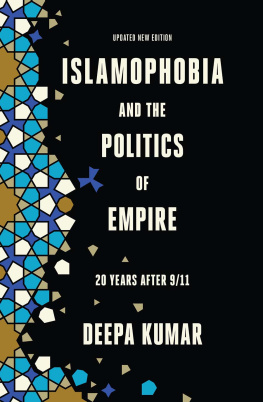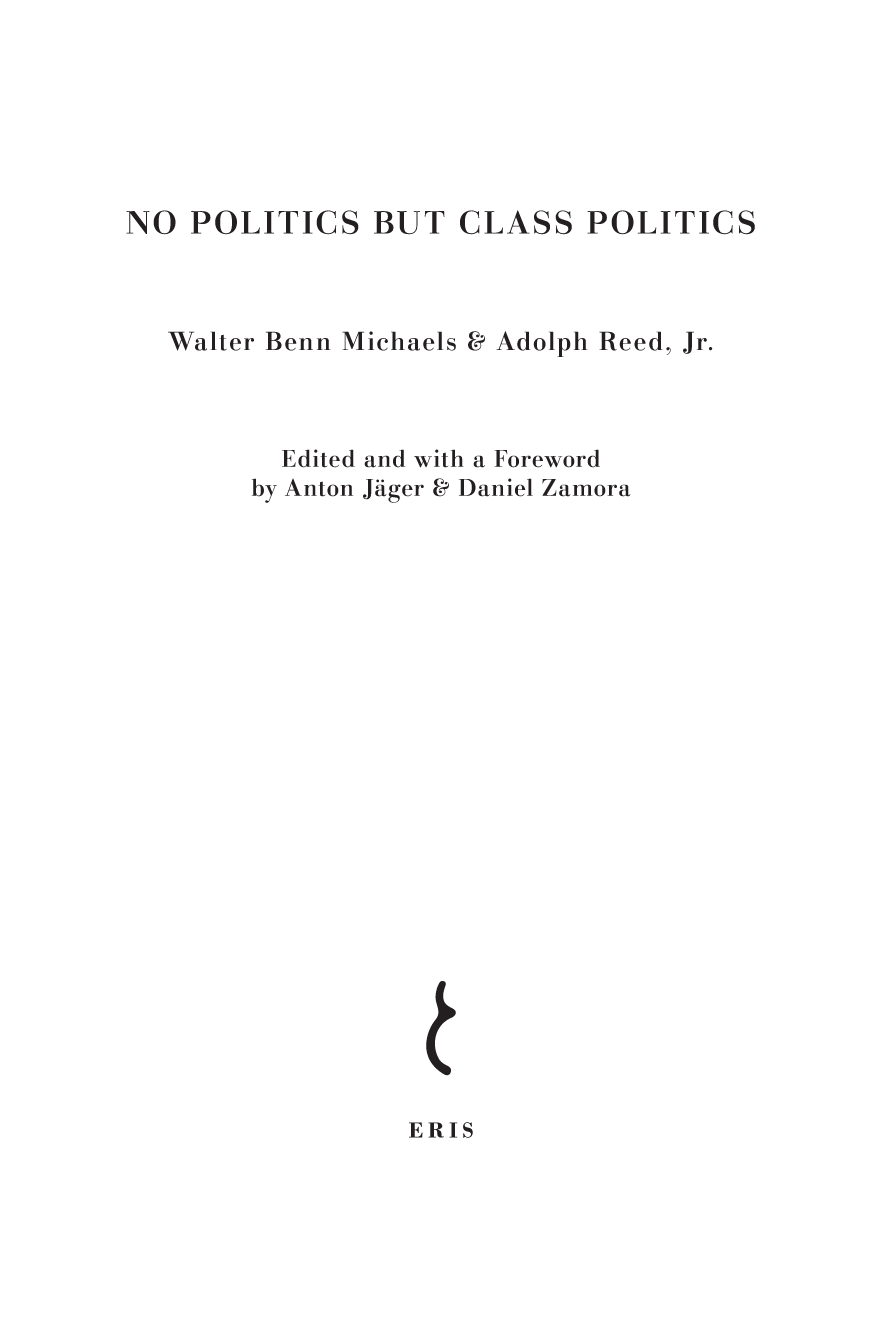Contents
Guide
This eBook is licensed to Vishnu Bachani, vbachani@nyu.edu on 03/14/2023

This eBook is licensed to Vishnu Bachani, vbachani@nyu.edu on 03/14/2023
This eBook is licensed to Vishnu Bachani, vbachani@nyu.edu on 03/14/2023
ERIS
57 Berkeley Square
London W1J 6ER
All rights reserved.
The selection 2022 ERIS
Individual texts their authors
Design by Alex Stavrakas
Cover photograph by Daniel Shea
ISBN 978-1912475-57-5
No part of this publication may be reproduced, stored in a retrieval system, or transmitted in any form or by any means, electronic, mechanical, photocopying, recording or otherwise, without prior permission in writing from the Publisher.
eris.press
This eBook is licensed to Vishnu Bachani, vbachani@nyu.edu on 03/14/2023
Contents
Foreword
Anton Jger & Daniel Zamora
Marx, Race, and Neoliberalism
Adolph Reed, Jr.
What Matters
Walter Benn Michaels
The Limits of Anti-Racism
Adolph Reed, Jr.
From Black Power to Black Establishment: The Curious Legacy of a Radical Slogan
Adolph Reed, Jr.
Beyond the Great Awokening: Reassessing the Legacies of Past Black Organizing
Adolph Reed, Jr.
The Trouble with Diversifying the Faculty
Walter Benn Michaels
Race, Class, Crisis: The Discourse of Racial Disparity and Its Analytical Discontents
Adolph Reed, Jr. & Merlin Chowkwanyun
The Political Economy of Anti-Racism
Walter Benn Michaels
Autobiography of an Ex-White Man: Why Race Is Not a Social Construction
Walter Benn Michaels
Believing in Unicorns
Walter Benn Michaels
From Jenner to Dolezal: One Trans Good, the Other Not So Much
Adolph Reed, Jr.
Identity Politics: A Zero-Sum Game
Walter Benn Michaels
Django Unchained, or, The Help: How Cultural Politics Is Worse than No Politics at All, and Why
Adolph Reed, Jr.
Who Gets Ownership of Pain and Victimhood?
Walter Benn Michaels
Chris Killip and LaToya Ruby Frazier: The Promise of a Class Aesthetic
Walter Benn Michaels & Daniel Zamora
Interview One: 27 May 2021
Walter Benn Michaels & Adolph Reed, Jr. in conversation with Anton Jger & Daniel Zamora
Interview Two: 3 June 2021
Walter Benn Michaels & Adolph Reed, Jr. in conversation with Anton Jger & Daniel Zamora
Interview Three: 10 June 2021
Walter Benn Michaels & Adolph Reed, Jr. in conversation with Daniel Zamora
Interview Four: 1 July 2021
Walter Benn Michaels & Adolph Reed, Jr. in conversation with Anton Jger & Daniel Zamora
Conclusion: The Trouble With Disparity
Walter Benn Michaels & Adolph Reed, Jr.
This eBook is licensed to Vishnu Bachani, vbachani@nyu.edu on 03/14/2023
For Ken Warren
This eBook is licensed to Vishnu Bachani, vbachani@nyu.edu on 03/14/2023
In April 2021, as the world economy slowly began to crawl out of its corona crater, the American magazine Forbes published its annual ranking of world billionaires. Although part of an annual tradition, 2021s ranking was also singular: the pandemic had thrown millions out of jobs, devastated labor markets, and left more than four million dead. The magazine had more prosaic news to announce: its global register had grown by 493 units, adding $5 trillion in wealth to the planets upper percentile. Over the course of the pandemic year, the new economy had spawned a new billionaire every seventeen hours. Such numbers, Forbes editor Randall Lane noted, will engender endless amounts of consternation. Capitalism was still the greatest system ever for generating prosperity, but it was now clearly having a hard time lifting all boats.
Despite the pandemics deleterious effects, Lane had also rarely felt so optimistic.
The list compiled by Forbes joins a now familiar genre of class apologism crossed with celebration of increasing upper-class diversification. The staggering rise in inequality following the 2008 crisis went hand in hand with an increasing focus on and concern for what the economist Paul Krugman has called horizontal inequality, mainly applied to disparities of race and gender. Like many of his ad-hoc analyses, Krugmans push for an anti-discrimination revolution was not of his own coinage. Its almost like a mathematical theorem Far from being a political paradox or a patent example of corporate hypocrisy, the triumph of anti-discrimination as a global model of social justice has slowly mutated into one of the pillars of the meritocratic justification of inequality. In a society where forty per cent of Americans are unable to cover a $400 emergency bill but where Jeff Bezos can buy a half-a-billion yacht, equality of opportunity can still offer a convenient substitute for any socialist alternative. As long as the occasional glass ceiling can be broken and workers undertake training to become less white, the conversation about unions at Amazon warehouses can be evaded.
In the United States alone, estimates for corporate spending on awakening sessions, racial sensitivity trainings, or self-reflexive workshopsfacilitated by a veritable army of consultants, coaches, and trainersnow run close to $8 billion
The essays assembled in this volume constitute one of the most sustained and coherent critiques of contemporary anti-racism advanced from the left. Spanning more than a quarter century of writing on topics as diverse as photography, the history of the civil rights movement, and the class function of higher education, they offer a precious alternative to the identitarian approaches that have become increasingly prevalent on the political left. Such a perspective has become especially relevant in a context where the criticism of identity has largely been monopolized by a right which is dedicated only to promoting its own version of identitarianism. Often caught up in competing versions of identity politics, or in the empty opposition of woke vs. anti-woke, the left needs now more than ever an alternative account of what a class politics could mean today. Reed and Michaelss point has never been that racism is not a problem or that it is undeserving of total eradication. Their claim, rather, is that its solution has little to do with the problem of capitalist inequality. In making this claim, the arguments assembled in this volume offer the most articulate alternative yet offered to what they call a right and left neoliberalism. No Politics but Class Politics offers an extensive overview of Reed and Michaelss arguments concerning the question of identity, the rise of anti-racism, diversity programs, and the relation of each of these components to a specifically neoliberal aesthetic.












